As someone who has helped managers for many years, one of the most important things I've learned a senior leader can do is to prioritize professional development for themselves and their managers.
All too often, I see managers struggling because they haven't set clear goals for growth and their manager has completely ignored improving their skills.
So, what should be on a manager's personal development plan?
In my experience, there are 8 key areas that transform good managers into exceptional leaders. These professional development goals have been game-changers for countless managers over the years.
Whether you're looking to improve as a manager, or you're a senior leader wanting to help your managers with their growth and development, these professional development goals can make the difference:
Table of Contents
- Part 1: Develop soft skills
- Part 2: Teach them time management skills
- Part 3: Help them develop a growth mindset
- Further reading
Professional Development Goals for Managers Part 1: Develop soft skills
One of the biggest changes in becoming a manager is how much more of a people job it is than your IC work was. For many managers, this is a steep learning curve.
Here are 3 important development goals to work on to improve your soft skills:

1. Learn how to have effective 1 on 1s
Hopefully, your managers already have regular 1 on 1s, but are they effective?
Many managers have one on one meetings with their team, but they make critical mistakes that end up wasting that valuable time, such as:
- Using 1 on 1s for status updates
- Not having good questions prepared to ask your team to cover the right topics, and avoid awkward silences, and/or
- Frequent cancellations, disrupting the rhythm and depth of relationship
Many of these problems can be solved and your meetings will go a lot smoother with a good 1 on 1 template combined with learning how to use that template well to guide your meetings.
That involves knowing what to do:
- Before 1 on 1s: Meeting often enough (ideally every week or two), spending enough time in the meeting (ideally an hour), and being prepared ahead of time by putting real thought into it by creating a 1 on 1 agenda.
- During 1 on 1s: Asking great questions will expand what you talk about to cover all the most important topics, then setting clear next steps and expectations builds momentum and accountability.
- In-between meetings: Taking action, following up, and keeping the meetings consistently can make all the difference in the long term value of your 1 on 1s.
By making the most of these meetings, it shows your team members you value them, and helps keep them motivated and growing.
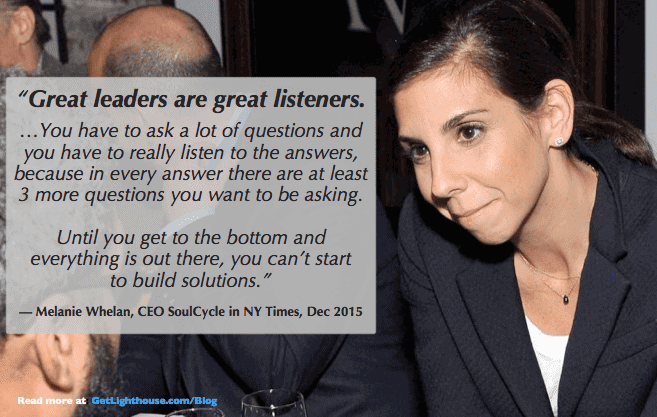
2. Be a more effective listener
Curiosity is a priceless skill for leaders. One crucial development goal for a manager is to master the skill of asking good questions. By doing so, you'll uncover useful insights from your team members that will help you lead better, fix problems when they're small, and learn what your team members need most to thrive.
This really comes down to two things:
- Asking great questions: Curiosity isn't passive. You need to have great questions that allow you to explore a topic and uncover insights. Every good discussion in a 1 on 1 starts with the right set of questions.
- Listening to what they have to say: No question matters if you don't truly listen to what they have to say. True listening means giving undivided attention and asking genuine follow-up questions to make sure you really understand what they're saying.
The questions you ask in 1 on 1 s are especially powerful, because it is a dedicated private time where you can have more candid conversations with your team. That means it's particularly important to teach your managers to ask their team a variety of questions during their 1 on 1s to uncover key insights, like:
- How do you feel your work/life balance is right now?
- What drives you? What motivates you to come to work each day?
- What area of the company would you like to learn more about?
- What aspects of your work would you like more or less direction from me?
- When was the time you enjoyed working here the most?
And get over 100 more great 1 on 1 questions here: One on One Meeting Questions Great Managers Ask Their Teams
Listening well is also a very important skill for managers.
If you want to master this development goal, you need to do more than just hear the words your team members say. Try to understand what they really mean.
Practice active listening by asking clarifying and follow-up questions, then repeating back what you think you heard to see if your team member agrees, or wants to clarify further.
If this is an area you need to work on, go a lot deeper in our detailed post: "How Managers Can Be More Effective Listeners."
3. Learn how to get buy-in
As many leaders learn early in their career the hard way, before you can make big changes, you need to get buy-in.
You can't get much done as a leader if people won't follow you. However, that doesn't just happen because you're the boss. Instead, you have to learn how to get buy-in from them.
The first and most important thing in getting buy in is to learn how to get a first follower. The first person to buy in is much harder than all the others, so you need to pay special attention to them and what it takes to get them on board.
Then, once they are on board, you'll start to understand what it takes to get others will to join as well. Next thing you know, you'll have a movement and full team buy-in.
This awesome video by entrepreneur Derek Sivers captures perfectly how that happens by watching a lone dancer on the hill become the leader of a big dance party:
Avoid the fatal mistake of leaders without buy-in
The biggest mistake that managers make is to make a decision on their own and then broadcast that decision to the entire team without giving them any time to offer their own input.
When you do that, you make your team feel like they don't have a say in things. You also have no idea how they feel about the decision before announcing it, nor any of their ideas that could improve what you're doing.
If you can uncover potential concerns and issues beforehand, you can anticipate objections and present the idea in a way that will be most exciting to them. You'll also hear potential ideas for improvement based on what they think if you give them a chance to share their thoughts.
One on ones are great for uncovering these insights and finding out what it takes to get buy in from your team members. They're also key to making the right adjustments and changes before announcing major decisions and changes, so you've already got your first follower by the time the decision is announced broadly.
If you want to learn more about getting buy-in you can read about the step by step process for getting buy-in here.

Professional Development Goals for Managers Part 2: Teach them time management skills
As an individual contributor, you likely spent a lot of time improving your productivity and getting better at your job. You took pride in how much you could get done, and the quality of your work.
Now, as a manager, you need to do more than simply improve yourself.
Once you become a manager, any time management hacks you mastered are trumped by the importance of priority management. Your individual productivity isn't nearly as high-impact as improving your team's.
Now, you need to determine what the most important tasks are for you and your team, then prioritize those things above others that could easily fill your day.
As a manager, you need to carefully consider what your team can accomplish collectively– as opposed to only measuring yourself based on what you can get done on your own.
What we're really getting here is that you must develop a multiplier mindset.

4. Become a Multiplier
The combined productivity of your team is significantly higher than what you can do on your own. Despite this, it's a common mistake for managers to still focus on their personal productivity when, in fact, boosting the effectiveness of their team should be the primary goal for a manager.
Instead, you need to spend the lion's share of your time asking yourself, "how can I make my team more productive?"
For example, a blocker may be affecting 3 separate team members. By investing your time into clearing that blocker, you've now positively impacted the productivity of all three people at once. How many hours of your own time would you have to save to compare to unblocking 3 of your team members?
Former founder and CTO Camille Fournier does a great job breaking this down by numbers in her excellent Velocity Conference keynote:
So, how do you get your managers to start adopting a multiplier mindset?
Teach them to start looking for opportunities to be a multiplier, like the example above.
However, they do not have to think of everything themselves. Instead, they can look to their team for ideas just as much as their own. To uncover these things, you can teach them to ask their team questions like:
- How could we change our team meetings to be more effective?
- Do you feel like you're on the same page with the rest of the team? How often do you think you need meetings to ensure you stay that way?
- Is everyone pulling their weight on the team?
- Are you uncomfortable giving any of your peer's constructive criticism? If so, why?
With a little digging and the right questions, you'll find many opportunities to unlock, unblock, and improve your team. However, you will never learn these things if you focus all your time solely on your own productivity and effectiveness.
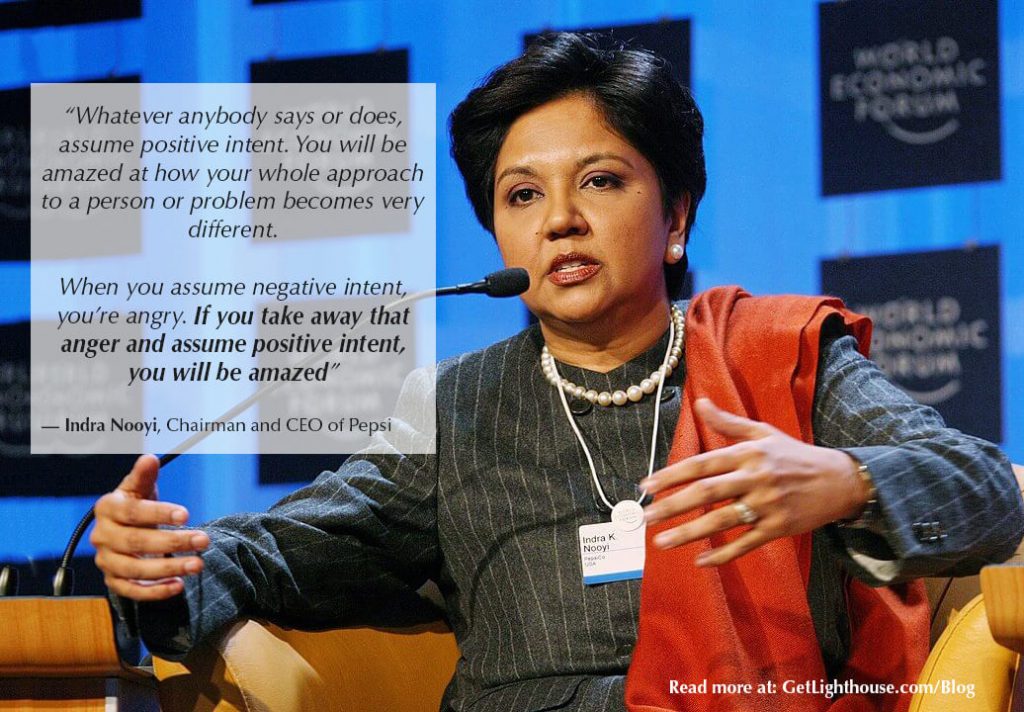
5. Learn to manage your energy and stay positive
Similar to developing a multiplier mindset, as a leader, your mood is a key way you can affect your team in an exponential way. Learning to manage your energy is a soft skill that is just as important as any hard skill in a manager's development plan.
If you're stressed, your entire team will pick up on those little cues you're giving off, and could become stressed, too (whether you're aware of them or not). Unfortunately, this goes for every emotion, from stress to positive emotions like excitement, and negative ones like anger and frustration, too.
Teaching your managers to take care of themselves is important for other reasons, too.
Your emotions may be caused by your environment.
As a manager, you're often putting out fires, so it's easy to fall into reactive management mode, only hearing about problems when they're causing a big mess. This often goes hand in hand with having a crazy calendar that looks something like this:

The problem that happens when your week looks like this is you don't give yourself any room to sit back and breathe. You lose that critical time to see the big picture and reflect on things like:
- Future projects and goals
- "Forest for the trees" moments that help you better understand a problem
- Changes to team structure or processes
- Larger business decisions if you're a founder/CEO or department lead
Leadership requires looking to the future, anticipating changes, and making proactive adjustments. For that, you need to give yourself space to sit back and think. It also means getting perspective and distance from potential initial negative reactions and emotions.
To master all of this, teach your managers that it's okay, and valuable, to take a break when needed and truly reflect.
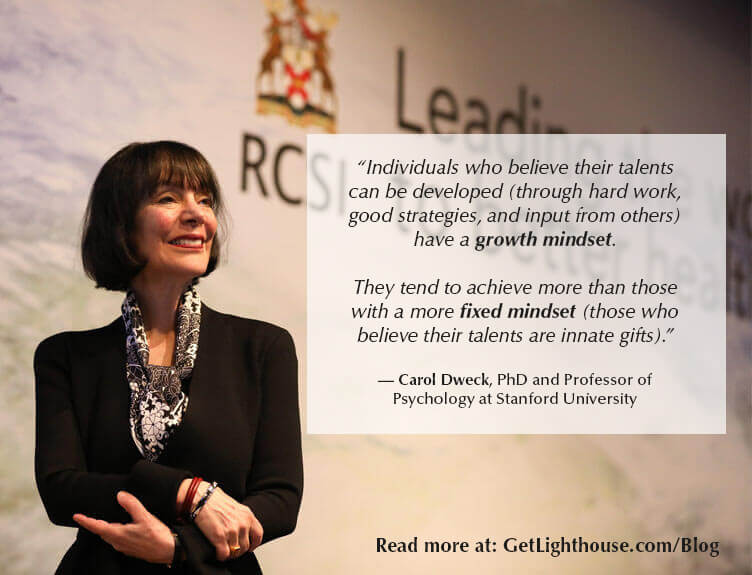
Development Goals for Managers Part 3: Help them develop a growth mindset
It's not enough just to want to grow your managers. They have to believe they can grow, and develop the right growth practices to get there.
Your managers have to embrace a growth mindset, and learn new skills both to succeed in their role and with their teams.
The fact is, your managers' teams won't thrive if their manager doesn't believe they can develop new skills.
Instead, they'll feel suffocated and bored doing only the same things they are currently trusted to do. They'll also be held back if their manager isn't learning the skills necessary to level up as a leader, because that includes skills for growing their team members.
Here are 3 growth-minded professional development goals for managers:

6. Become a regular reader
If you've been a leader for long, you know that learning never really ends.
That's why building a regular reading habit of reading is such a great development goal. You will always be learning and leveling up if you're consistently reading.
And if you can get your managers and team members to embrace reading, they'll always be developing their skills, too.
To get you, or them, started, we’ve put together a curated list of great books, including some of my all time favorites (listed below) that will help anyone who wants to become a great manager:
- How to Win Friends and Influence People by Dale Carnegie – Teaching you how to build relationships and become an effective communicator.
- High Output Management by Andy Grove – Gives you key frameworks and tactics to follow to effectively manage your time, your team, and your outputs.
- The 7 Habits of Highly Effective People by Stephen Covey – Helps you master habits that will make you more successful as both a leader and in life.
- Never Split the Difference by Chris Voss – The single best book on negotiation and sales I’ve ever read, which are a pair of skills all leaders need.
If you want more ideas for great books to read depending on your interest and need, you can check out our curated list of 12 amazing leadership books.
No Bueno.
— Mark C. Crowley (@MarkCCrowley) February 22, 2024
Nearly half (46%) of Americans didn't read a single book last year, according to a new Economist/YouGov poll of 1,500 Americans.
If you read more than two books in 2023, you’re in the top half of U.S. adults. #Education #Leadership #GrowthMindset #LeadFromTheHeart pic.twitter.com/3uzUqFYx26
Who has time to read!?!
It’s important to recognize that reading is a habit that does take effort by you. The benefits of reading happen only when you make it part of your routine.
That’s why we encourage you to reflect on when you can most easily fit reading into your daily life.
Depending on your circumstances, the ages of any kids you have, and your work environment, different times may work, but here’s a few I’ve seen work for others:
- First thing in the morning when you wake up, but your family is still asleep
- While you eat lunch or a snack
- On your commute to and from work
- For 20 minutes before going to bed instead of watching TV
The point is that no matter your situation in life, finding 20 minutes a day to read can be transformative, and it will make you stand out against the average person, who we can see from the Tweet above doesn’t seem to read at all.
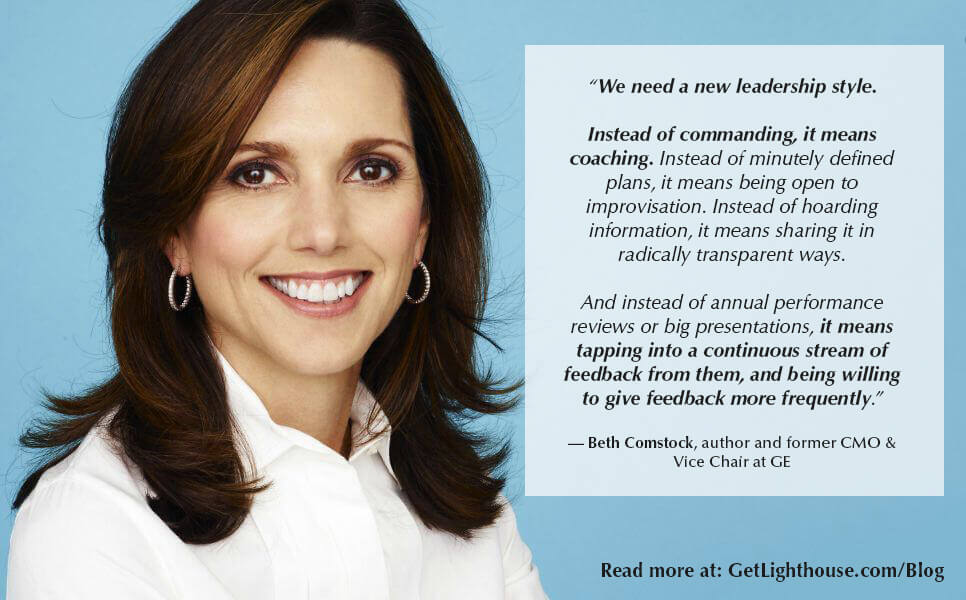
7. Be a great coach
When you're an individual contributor, all you need to do is grow yourself. When you're a leader, it becomes important to not only grow yourself, but also grow your team. That's why your managers must become coaches.
This means being comfortable talking with your people about their goals and determining small steps to help them achieve those goals over time. It means taking a look at their work and giving them constructive feedback to improve, and praise to let them know what you want to see more of.
The important thing to remember is what this investment really means; if your team succeeds, so do you. If your team fails…it's a bad sign for you.
By becoming a great coach, you'll not only boost your team's performance, you'll often also better motivate them.
We are all happiest when we feel like we're moving forward and making regular progress. As researchers Teresa Amabile and Steven Kramer discovered, it's actually the #1 contributor to being happy at work:

Your best team members want to keep getting better. Spending time coaching them shows you care about their goals. It motivates them.
Also, recognize that growth isn’t just about the next promotion (which may not always be available). It is also about mastering your existing role, and expanding your knowledge and skills.
This means it’s your job as coach to help your team members get better and better at what they do now, not just focus on a rubric for promotions.
Further Reading:
Need help providing growth opportunities and plans for your team? We have you covered:
- Learn how you can grow your teammates even if you can’t promote them.
- If some of your team doesn’t know how they want to grow, start here; How to help when your team member can't answer, "What are your career goals?”

8. Identify future leaders
Every good manager who develops their skills eventually has too big a team to manage themselves. When that happens, you need to start developing leaders of your own (or ideally a bit before you hit that wall).
This all depends on how your company is run, but if it's in your power, it's a great idea to try to promote from within. There is risk, and great rewards, from promoting key employees who already know your company, your values, and likely many of the people whom they'll be leading.
Fortunately, much of the risk of promoting from within can be avoided or mitigated. Some common mistakes when promoting from within to coach your manager to avoid include:
- Promoting based on individual contributor abilities, not leadership skills
- Not having consistent one on ones with those new managers to support them
- Failing to provide leadership training to prepare future managers before they take the position
Once you feel a manager you're coaching is in a position to start promoting their first manager(s), set a goal with them of identifying a few people on their team as potential future leaders. Challenge them why and ask them to discuss the idea with each person to see if they're interested.
Once they've identified one or more potential leaders, have them check out these guides to help them prepare those team members for leadership:
- 7 Tips for First-Time Managers: How to Succeed as a New Manager
- Developing Leaders: What To Do When Your Team Grows Too Big
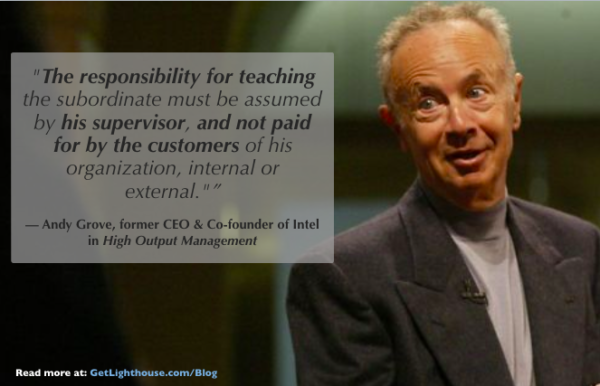
Are you growing your leaders?
Being a manager requires a life-long growth mindset.
There's always more to learn about how people work, whether that's on an individual basis, or how we function as groups. To develop your managers into great leaders, you need to set them up with the right game plan for developing those critical leadership skills.
Keep in mind, these professional development goals are some of the most important to start with, but they're not everything. Their learning– and yours– is never over. Otherwise, that's how you end up with an organization plagued by the Peter Principle.
Want one place to document and organize all your team's goals for professional development? Download our free 1:1 meeting template now.

And, to keep your and their learning going, check out these posts:
- How to Help Your Team Achieve Their Goals
- The Hardest Skill of All for Managers to Learn and Build
- Employee Development Plans: The Competitive Edge to Winning the World Series and Helping Your Team Thrive




